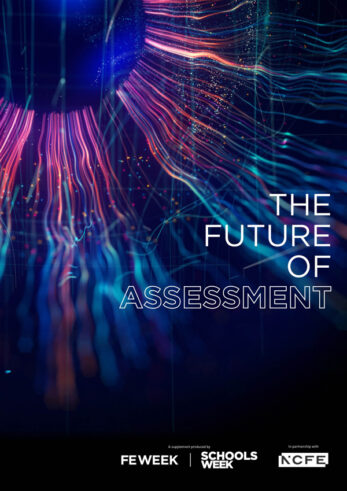The government plans to introduce a mandatory reading test for year 8 pupils in its upcoming schools white paper, amid fears poorer children are disengaging in the early years of secondary school.
The introduction of the check would mark the first statutory testing for key stage 3 pupils since SATs for 14-year-olds were scrapped in 2008. It would mean England’s pupils taking a compulsory national test in seven of their 14 years at school.
Schools Week understands the test would be administered at the end of year 8 and that ministers hope to put it in place from the 2028-29 academic year, however plans are still being finalised.
While government and Ofsted will have access to schools’ data, it would only be published at a national level – like the phonics check.
It is also understood a school’s performance in the test would not trigger intervention by the Department for Education’s regions groups or improvement teams, nor an early inspection.
‘Must not be another accountability measure’
Pepe Di’Iasio, general secretary of the ASCL leaders’ union, said many schools already assessed year 8 pupils for learning gaps, and a “standard test may help to support a consistent approach”.
“If done well – straightforward to administer and without creating new curriculum expectations – it could be helpful in that respect.”
But he said it was “important that this does not end up becoming another accountability measure – either through the publication of results or as part of Ofsted inspections.
“Even if there are assurances from this government, school leaders may well be uneasy about what future governments might do with these tests once they’re established. They’ve been bitten too many times.”
Concerns poorer pupils held back
The policy has been prompted by concerns poor reading is holding pupils back from accessing the curriculum in other subjects.
Ministers are particularly worried about pupils – particularly the disadvantaged – disengaging during their first years at secondary school.
There are also concerns that many pupils leave primary school unable to read properly and then go on to fail their GCSE English.
This year, 25 per cent of pupils in year 6 did not meet the government’s expected standard in reading in their SATs tests.
Almost 30 per cent of GCSE pupils fell below a grade 4 in English, considered a “standard pass” by government.
Progress between key stage 2 and key stage 3 has not been measured nationally since 2009. A 2011 research report from the Department for Education found pupils eligible for free school meals “make less progress during key stage 3”.
Dave Thomson, of FFT Education Datalab, said the progress measures were “often useful in identifying pupils who were at risk of making poor progress to key stage 4.
“Although it is more than likely that schools will be aware of these pupils in any event,” he added.
The government maintained a national assessment framework for key stage 3, but it was scrapped by the coalition in 2014 when it axed curriculum levels.
This has left schools to develop their own internal assessments to check progress during key stage 3, or buy in standardised tests from external providers.
Current testing ‘a black box’
Schools often run baseline testing in year 7, but “we don’t know if that information is used very well,” said Alex Quigley, head of content and engagement at the Education Endowment Foundation.

“It is a bit of a black box. If there’s almost a nationalisation of standardised reading assessments, that’s a really interesting proposal. It might save schools a huge amount of money and time.”
Officials are still considering what form the check will take and what it will assess.
They are also still deliberating whether – like the phonics check in year 1 – it will be administered on-screen or with pen and paper. But it will be externally marked.
Quigley added there was a case for the check to be targeted at “more foundational reading skills, like decoding and fluency”.
“You’ve got to create a test that both helps diagnose children who are really struggling, and that might be [with] some foundational skills, whilst not being so far away from the secondary curriculum that teachers don’t know how to support children through it or after it.”
The final design will also depend on the outcome of the curriculum and assessment review, which is due to report later this autumn.
However, there was no mention of any key stage 3 testing in its interim report, published earlier this year.
The policy is set to be revealed as part of the government’s white paper, due this term.
Questions over timing of tests
However, government also faces questions over the plans to introduce the tests in year 8.
It is understood ministers want to allow time before the start of key stage 4 for support to be put in place.

But Geoff Barton, a former English teacher and former general secretary of ASCL who led the recent Oracy Commission, said it was “surprising a child would have a reading assessment less than two years after they’ve had one at key stage 2”.
He pointed to Ofsted’s 2015 report “Key stage 3: the wasted years?”, adding: “Doesn’t taking this test in year 8 just reinforce the idea that it can be done in two years? Wouldn’t it be better to do the test in year 9?”
Ofsted has also previously criticised schools who started their GCSEs in year 9.
Quigley also raised workload fears, adding: “Any sort of test preparation becomes a stress and a pressure on teachers, that’s just the reality.”
And responding to our story, Daniel Kebede, general secretary of the National Education Union, said: “It is beyond belief that this government’s response to students disengaging in secondary isn’t to consider the impacts on curriculum caused by the tests that already exist in primary but rather is to suggest an additional test in year 8.
“Any caveats suggesting the results will only be published nationally are effectively meaningless. There’s nothing to stop future governments publishing them school-by-school, allowing Ofsted to use them or encouraging leaders to focus on them.
“All of which would lead to the same consequences we see wherever national test data exists – punitive labelling of schools, narrowing curriculum and increased stress and workload for staff and students.”
Concerns over SEND plans
Ministers have also promised to set out their plans for SEND reform as part of the white paper.
But several sources told Schools Week officials are now considering how much of their SEND reform programme should be set out in the white paper.
The education select committee, in a report last week, urged to “fully engage” parents in an “active and meaningful” way. Government is already facing a backlash from parents of children with SEND after reports EHCPs could be scrapped.
Ministers are expected to publish a consultation on the SEND plans after the white paper – and conversations are ongoing around whether more details should be saved for that.
However Schools Week understands that no decisions have been made.
DfE sources insisted the white paper will set out a clear vision for an inclusive mainstream system.














Your thoughts